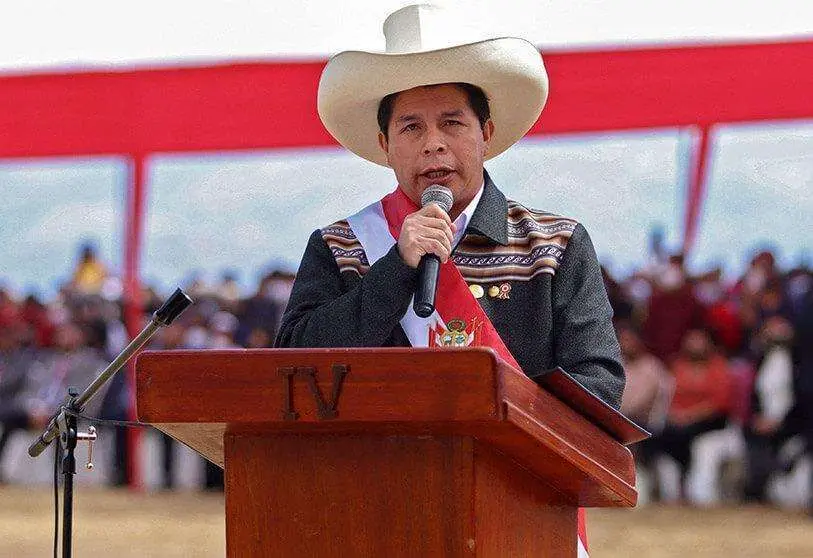Peru ousts coup leader Castillo and enthroned a woman of the far left

The Peruvian Congress withstood the challenge of the former teacher, trade unionist and figurehead of the extreme left, Pedro Castillo, who had emulated the bad example set by Alberto Fujimori in April 1992: to carry out a self-coup d'état. It worked out well for Fujimori, although he ended up in prison after being tried for crimes committed during his dictatorship, in which he had the bloodthirsty and corrupt Vladimiro Montesinos as his strongman. Pedro Castillo, nicknamed Sombrero Luminoso by his enemies, has turned out badly, to the extent that he has neither seized the total power he sought nor managed to flee with his family, which is the subject of some 50 court cases for alleged corruption.
The former rural schoolteacher had followed the manual dictated to him by his mentors in the Sao Paulo Forum, the alliance invented by Fidel Castro in 1992, following the collapse of communism and the Soviet Union, so that such a defeat would not eradicate the extreme left from Latin America forever. Pedro Castillo, who was about to face his third motion of censure in just over a year in office, wanted to pre-empt Congress and proceeded to dissolve it by decree, set up a government of national emergency and promise general elections in nine months, which would supposedly bring about a constituent assembly.
Castillo read the decree with obvious nervousness, as his trembling showed, but he was ultimately urged to do so by his special adviser Antauro Humala, a former military officer and brother of former president Ollanta Humala (2011-2016), who like almost all other Peruvian heads of state in recent decades has had to spend time behind bars. The hesitant Castillo seemed to be convinced by Antauro Humala's supposed certainty that, as soon as he had pronounced his decree to dissolve the legislative branch, a crowd of ex-military reservists would take to the streets to surround Congress, disqualify the deputies and throw them out of the building, followed by the full assumption of all powers by the President of the nation, who would govern without ties at the stroke of a decree.
Castillo was right to display his trembling in front of the cameras. Only on Saturday, 3 December, he had been presented with his resignation by Defence Minister Daniel Barragán, who had already expressed his disagreement with the attempted self-coup to which Castillo was already being pushed by the extreme left that supported him. Barragán, however, had tried to swim and keep his clothes on, since he had been asked to sound out the leadership of the Armed Forces as to how they would react to a hypothetical assault on Congress. They replied that they would do their duty to respect and ensure respect for constitutional legality and would not even "turn a blind eye" to such a manoeuvre. Aware of what was in the offing, other members of the Cabinet were also submitting their resignations to the president.
In spite of everything, the weak and weak-minded Castillo decided to go ahead, at the instigation of both Antauro Humala and the military officer who had hastily replaced Barragán, Gustavo Bobbio, a man experienced in coups d'état, as he had already participated in several attempts, all of them unsuccessful, against Alberto Fujimori and Alejandro Toledo.
But neither the legislature nor the judiciary agreed to dissolve and passively acquiesce to the coup d'état perpetrated from the House of Pizarro. On the contrary, the deputies proceeded to vote to remove President Castillo from office for "permanent moral incapacity", this time with a comfortable majority of more than a hundred votes, compared to the two previous attempts to remove him from power by means of motions of censure.
Immediately, the Congress, in accordance with constitutional legality, proceeded to enthrone as head of state the hitherto vice-president Dina Boluarte, a 60-year-old lawyer who, like Castillo, had aligned herself with the neo-communist extreme left and the postulates of the Sao Paulo Forum and the Puebla Group. Boluarte had barely been vice-president for two weeks, a post she had taken after almost a year and a half as Minister of Development and Social Inclusion.
Whether as a tactical move or as a more far-reaching strategy, Boluarte had not only distanced herself from Castillo's coup intentions, but was the first to pronounce the expression "coup d'état" upon the issuance of Castillo's dissolution decree.
This obvious attempt to seize power and establish an extreme left-wing totalitarianism aside, Peru has a lot of work to do to regain balance and stability. There is nothing to suggest that the political parties will row in the direction of guaranteeing institutional respect for the Constitution for a long time, especially when in other countries in the region there have been, and in some cases consummated, revolutions that have led to totalitarian dictatorships, or at least to "dictacracies", that is to say, dictatorships with elections.
As for Castillo, yet another failed page in the infamous history of the coup. Apparently, he had entered into talks with the embassies in Lima of Mexico and Bolivia, whose respective presidents had given orders to receive him. The blockade of both compounds by a mob prevented the ex-president and his family, as well as some of his collaborators, from fleeing and taking refuge. Instead, the former president was arrested, and to the charges of corruption already hanging over him will have to be added that of attempted coup d'état to subvert the constitutional order.



